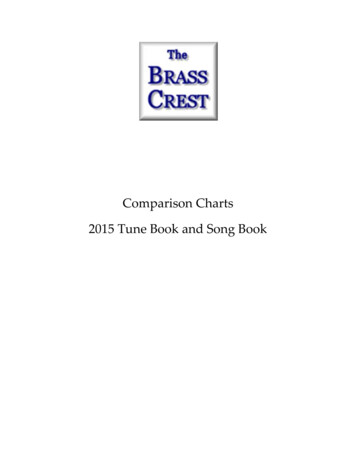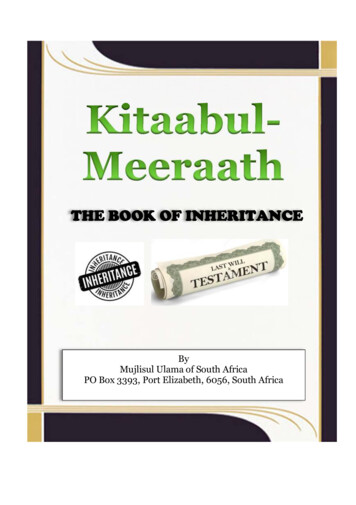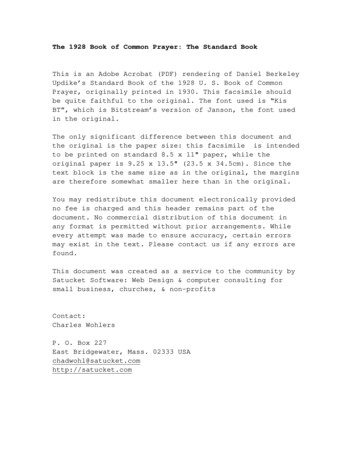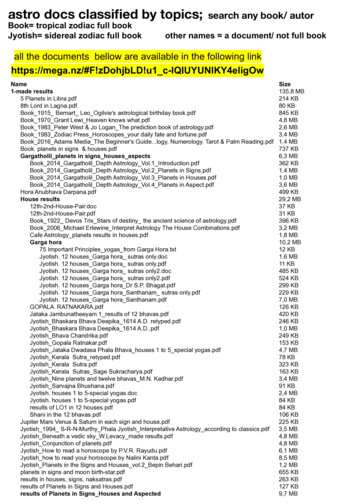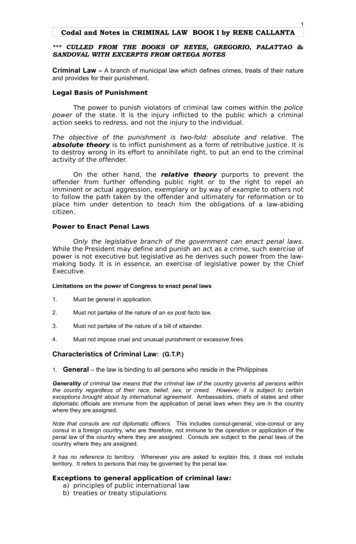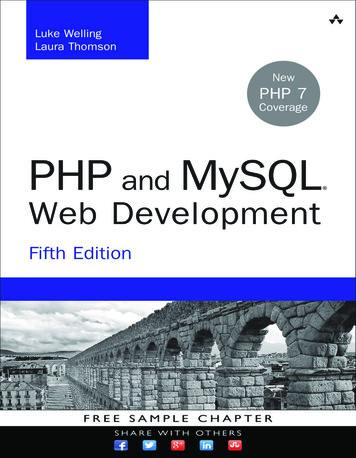
Transcription
Supplemental Notes:The BookofPhilippiansChuck Missler 2001 Koinonia House Inc.
IntroductionAudio ListingBackground. Paul’s First Visit to Philippi (Acts 16). How God Guides.Philippians 1Timothy. Our Security in Christ. The Christian’s Death Benefits.Christian Conduct.Philippians 2:1-11Four Pillars for Christian Unity. The Kenosis. The Great Parabola. Jesus’Names.Philippians 2:12-30Practical Examples. Living for Others. The Sanctity of a Commitment.Philippians 3:1-11The Advent of the Judaizers. Happiness vs. Joy. Losses Result in Gains.The Ultimate Goal.Philippians 3:12-21Winning the Race! Forgetting the Past. Finishing Well.Philippians 4Getting Along with Christians. The Meaning of Prayer. God’s Rules forDoubtful Things.SummaryPage 2PhilippiThe Book of PhilippiansIntroductionPhilippi was founded by the great Macedonian king whose name it bears.It is on or near the site of ancient wells or fountains known as “Crenides.”Its natural advantages were considerable: it was in the neighborhood ofgold and silver mines, which were exhausted in early times by thePhoenicians and Thasians. They passed successively to the hand of thepowers of civilized Europe: the Athenians, the Macedonians, and theRomans. During the Roman occupation we read little of them. The plainon which it was situated was remarkable for its fertility.However, its primary importance was its strategic geographical positioncommanding the great road between Europe and Asia. The almostcontinual mountain barrier between the East and West has a depressionhere which forms a gateway for this thoroughfare between the twocontinents. It was the advantage of this position that led Philip theMacedon to fortify the site of the ancient Crenides.It was this which marked out the very battlefield where the destinies ofthe Roman Empire were decided, and which led the conqueror to planta Roman colony on the scene of his triumph.Philippi was the scene of the decisive battle ending the Roman republicin 42 B.C. Brutus and Cassius, murderers of Julius Caesar in 44 B.C. , weredefeated by the combined forces of Mark Antony and Octavian, wholater became Emperor Augustus. Because of Philippi’s assistance,Augustus granted Roman citizenship to these Philippians when hebecame emperor.Augustus founded at Philippi a Roman military colony with the label,“Colonia Augusta Julia Philippensis.” He conferred upon it the covetedprivilege of “Italic right,” giving its inhabitants the same rights as if theywere living in Italy. (We will sense this when we explore Acts 16:21.)The First Church in EuropePaul’s first visit to Philippi is recorded with a minuteness that has fewparallels in Luke’s history. Luke joined Paul just as he crossed over intoPage 3
Europe, and he was with him during his stay in Philippi. He seems to haveremained there for some time after Paul’s departure—the first personplural is dropped at Philippi (Acts 17:1) and resumed in the same placeafter a lapse of six or seven years (Acts 20:5).This combines to make the visit to Philippi among the most striking andinstructive passages in Luke’s narrative.And they passing by Mysia came down to Troas.Towards the north, but blocked. Bithynia SE shore of Sea of Mamora,S. Shore of Black Sea.After they were come to Mysia, they assayed to go into Bithynia: but the Spiritsuffered them not.The Roman Province of Asia (the region where the seven churches ofRevelation 2 & 3 are located).And so were the churches established in the faith, and increased in number daily.Now when they had gone throughout Phrygia and the region of Galatia, and wereforbidden of the Holy Ghost to preach the word in Asia,Acts 165]6]7]8]Note the third person, “they.” Alexandreia Troas, a port on coast ofMysia, 30 miles S of Dardanelles.9] And a vision appeared to Paul in the night; There stood a man of Macedonia,and prayed him, saying, Come over into Macedonia, and help us.10] And after he had seen the vision, immediately we endeavoured to go intoMacedonia, assuredly gathering that the Lord had called us for to preach thegospel unto them.Notice the “we” by Luke. Some suspect that he, Luke, was the man inthe vision!11] Therefore loosing from Troas, we came with a straight course to Samothracia,and the next day to Neapolis;When Paul and his gang crossed the Dardanelles, they changed thewhole course of Western Civilization!Page 4Samothracia: highest in elevation of northern Aegean islands, midwaybetween Troas and Philippi. Neapolis: harbor of Philippi, 10 mi. inland;(favorable wind: two days; later it took five days).12] And from thence to Philippi, which is the chief city of that part of Macedonia,and a colony: and we were in that city abiding certain days.Paul always focused on strategic centers. He arrives about 20 years afterthe foundation of the Church at Jerusalem.13] And on the sabbath we went out of the city by a river side, where prayer waswont to be made; and we sat down, and spake unto the women which resortedthither.The story of two women: Lydia and a channeler! There was no synagogue (which requires 10 adult men); simply a women’s prayer meetingthat would become the first church in Europe.14] And a certain woman named Lydia, a seller of purple, of the city of Thyatira,which worshiped God, heard us: whose heart the Lord opened, that she attendedunto the things which were spoken of Paul.A sales rep. The celebrated purple dye was made from the murex, ashellfish. (Ref. by Homer.) Inscriptions of the guild of dyers have beenfound at Thyatira. (Thyatira was one of the cities Paul had to omit onhis way to Troas.)15] And when she was baptized, and her household, she besought us, saying, If yehave judged me to be faithful to the Lord, come into my house, and abide there.And she constrained us.(“Constrained”: only here and at the end of the Emmaus Road.)16] And it came to pass, as we went to prayer, a certain damsel possessed with a spiritof divination met us, which brought her masters much gain by soothsaying:“Divination”: pu,qwn puthon; in Greek mythology the name of thePythian serpent or dragon that dwelt in the region of Pytho at the footof Parnassus in Phocis, and was said to have guarded the oracle at Delphiand been slain by Apollo. Origin: from Putho (the name of the regionwhere Delphi, the seat of the famous oracle, was located).The priestess at the famous temple at Delph was called the Pythoness;the term Python became equivalent to a soothsaying demon. She was,Page 5
thus, Apollo’s “channel.” [There’s nothing “new” about the “NewAge”!]17] The same followed Paul and us, and cried, saying, These men are the servantsof the most high God, which shew unto us the way of salvation.The occult is always motivated by self-interest. Even “truth” is used to“suck them in”; soon it is mixed with error. On each previous occasion(Mark and Luke), Jesus commanded the acknowledging demon tosilence.18] And this did she many days. But Paul, being grieved, turned and said to the spirit,I command thee in the name of Jesus Christ to come out of her. And he cameout the same hour.19] And when her masters saw that the hope of their gains was gone, they caughtPaul and Silas, and drew them into the marketplace unto the rulers,26] And suddenly there was a great earthquake, so that the foundations of the prisonwere shaken: and immediately all the doors were opened, and every one’s bandswere loosed.27] And the keeper of the prison awaking out of his sleep, and seeing the prisondoors open, he drew out his sword, and would have killed himself, supposingthat the prisoners had been fled.He was accountable to pay their debts if lost. [Cf. Tetelestai: “paid infull” as the completion of their “certificate of debt.”]Good question. We all need to be certain of the answer.28] But Paul cried with a loud voice, saying, Do thyself no harm: for we are all here.29] Then he called for a light, and sprang in, and came trembling, and fell down beforePaul and Silas,30] And brought them out, and said, Sirs, what must I do to be saved?35]37]Page 738] And the serjeants told these words unto the magistrates: and they feared, whenthey heard that they were Romans.Magistrates were at substantial risk themselves! I love the way Paul“rubs their noses” in it!Whoops! They had a jurisdiction problem! Valerian Law: no Romanshould ever be bound: this was considered to be an offense against theempire. Pocian Law forbade any Roman to be flogged.And they spake unto him the word of the Lord, and to all that were in his house.And he took them the same hour of the night, and washed their stripes; and wasbaptized, he and all his, straightway.And when he had brought them into his house, he set meat before them, andrejoiced, believing in God with all his house.And when it was day, the magistrates sent the sargents, saying, Let those mengo.And the keeper of the prison told this saying to Paul, The magistrates have sentto let you go: now therefore depart, and go in peace.But Paul said unto them, They have beaten us openly uncondemned, beingRomans, and have cast us into prison; and now do they thrust us out privily?nay verily; but let them come themselves and fetch us out.“And thy house”: a prophecy, not a doctrine. The first male convert inEurope.31] And they said, Believe on the Lord Jesus Christ, and thou shalt be saved, andthy house.32]33]If infiltration doesn’t work, then direct oppression. Outright violencedemonstrates that one of the enemy’s strongholds was being attacked(Cf. 2 Cor 10:4; Eph 6).20] And brought them to the magistrates, saying, These men, being Jews, doexceedingly trouble our city,21] And teach customs, which are not lawful for us to receive, neither to observe,being Romans.36]34]The pride and privilege of Roman citizenship confronts us at every turn.This is the sentiment which stimulates the blind loyalty of the people “byadvocating customs unlawful for us Romans to accept or practice.” Thiswill be the basis of the redress and forces an apology in vv.37-39.22] And the multitude rose up together against them: and the magistrates rent offtheir clothes, and commanded to beat them.23] And when they had laid many stripes upon them, they cast them into prison,charging the jailor to keep them safely:24] Who, having received such a charge, thrust them into the inner prison, and madetheir feet fast in the stocks.25] And at midnight Paul and Silas prayed, and sang praises unto God: and theprisoners heard them.Adoration and worship. (Not, “deliver your servants,” etc.) Cf. Ps 113;115:11; 116:3,4,15,17; 118:6,29; 114:7.The concert was so successful that it brought the house down! Otherprisoners were “attentively listening.”Page 6
39] And they came and besought them, and brought them out, and desired them todepart out of the city.Phil 1:27Oh, please, would you be so kind as to leave quietly! This aspect will alsobe important for us to remember when we turn from Luke’s narrative toPaul’s letter to the Philippians. Addressing a Roman colony from theRoman capital, writing as a citizen to citizens, he returns in his thinkingto the political franchise as an apt symbol of the higher privileges of theirheavenly calling, to the political life as a suggestive metaphor for theduties of their Christian profession:Conduct yourselves in a manner worthy of the gospel of Christ.Our citizenship is in heaven.Phil 3:2040] And they went out of the prison, and entered into the house of Lydia: and whenthey had seen the brethren, they comforted them, and departed.Three Very Different ConvertsGal 3:28Neither Jew or Greek, slave nor free, male nor female, for you are all onein Christ JesusThe Purple-Dealer and Proselytess of Thyatira: an Asian; engaged inan important and lucrative business; devoted to the truths of the OldTestament.A Girl with the Divining Spirit: a Greek; treated by the law as a merechattel without any social or political rights, employed by her mastersto trade upon the impressionable ignorant; bearing the name of thePythian god, the reputed source of Greek inspiration, represented theequivalent what is presently called the New Age.The Roman Jailer: equally removed from both, held a subordinate officeunder government; whose worship was likely essentially political intone.First the proselyte, next the Greek, and lastly, the Roman: they wouldseem to symbolize the progress of Christianity throughout the world.They also illustrate the two great social revolutions Christianity hasaffected: the amelioration of woman, and abolition of slavery (Cf. Acts16:13; 17:4; 17:12). Cf. The solicitation of peace between Euodia andPage 8Syntyche (Phil 4:2-3). This is also the first recorded instance where wholefamilies are gathered into the fold. Lydia and her household and the jailerand all belonging to him are baptized into Christ.As in ancient days, the patriarch was the recognized priest of his clan,so in the Christian church the father of the house is the divinelyappointed center of religious life to his own family: the church in thehouse of Philemon grew into the church of Colossae (Philemon 2); thechurch in the house of Nymphas becomes the church of Laodicea(Colossians 4:15); the church in the house of Aquila and Priscillabecomes the churches of both Ephesus and Rome (1 Corinthians 16:19;Romans 16:5).The history of Paul’s connection with Philippi assumes a prominencequite out of proportion to the importance of the place itself.The persecutions which the apostle endured here were more thanusually severe and impressed themselves deeply on his memory, for healludes to them again and again:1 Thess 2:2But even after that we had suffered before, and were shamefully entreated,as ye know, at Philippi.Phil 1:30Having the same conflict which ye saw in me, and now hear to be in me.His marvelous deliverance is without a parallel in his history before orafter, and his labors surpasses his earlier and later achievements.Theunwavering loyalty of his Philippian converts is the constant solace ofthe apostle in his numerous trials. They are his “joy and
Revelation 2 & 3 are located). 7] After they were come to Mysia, they assayed to go into Bithynia: but the Spirit suffered them not. Towards the north, but blocked. Bithynia SE shore of Sea of Mamora, S. Shore of Black Sea. 8] And they passing by Mysia came down to Troas. Note the third person, “they.” Alexandreia Troas, a port on coast of




